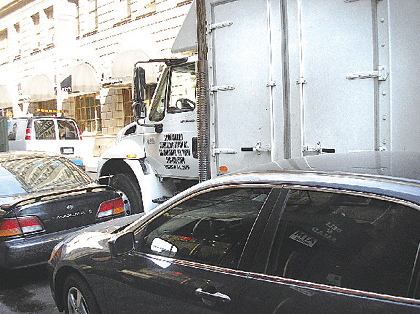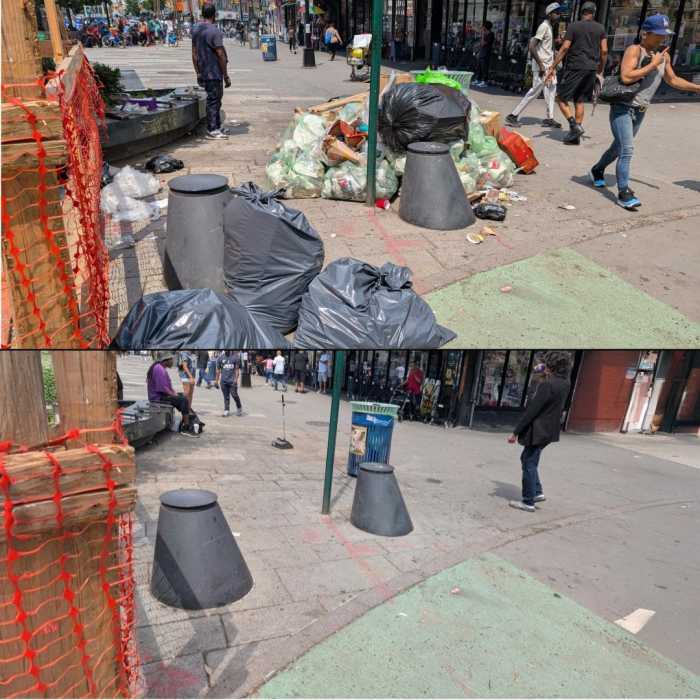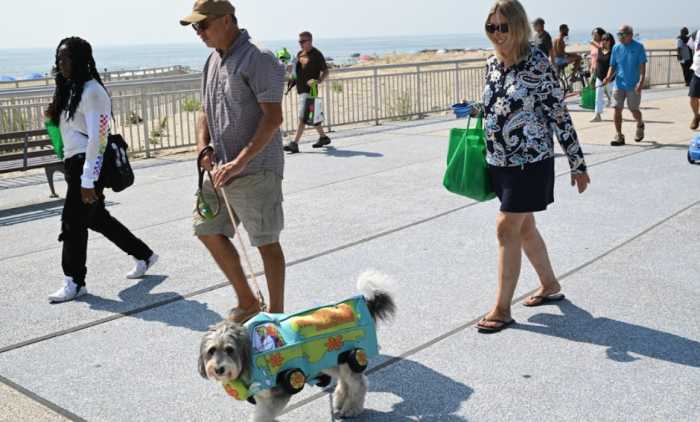By Skye H. McFarlane
Tuesday morning, a familiar scene unfolded on Fulton St. near the South Street Seaport.
The signs said, “No Standing Except Trucks Loading And Unloading” and “No Standing Anytime, Taxi Stand” but there were no trucks and no taxicabs parked at the curbs. The taxis trolled. The trucks stopped to unload in the center of the street. Pedestrians danced between bumpers. And the cars parked.
They parked under every kind of “No Parking” sign. They parked on sidewalks and in crosswalks. They parked on both sides of the street, along every curb. Police officers stood in two of the intersections, waving traffic past trucks and road construction. What they did not do was ticket any of the illegally parked cars. On nearly every dashboard, there was a government parking placard: N.Y.P.D., Department of Sanitation, Agency Business Parking Permit, State of New York Official Business, and so on.
A recent visit to the east end of Fulton St. from William to Water Sts. revealed that the area is one of the most acute examples of Lower Manhattan’s permit abuse problems.
A Transportation Alternatives study released last week surveyed placarded cars in nine neighborhoods around the city, including Chinatown and City Hall, and found that 77 percent of permits were being used illegally. Among the common violations were workers using “official business” permits to park their personal vehicles, workers parking in zones specifically designated for other agencies or uses, and illegally parked cars creating safety hazards — all of which could be found on Fulton St. Tuesday morning. Most egregiously, both the study and the Downtown Express observed the Police Department to be top on the list of permit abusers.
John Ost, a Southbridge Towers resident, said that all of the recent media attention about parking abuses near Chinatown and City Hall may have forced stubborn permit holders onto the curbs of Fulton St., making the problem worse in the Seaport.
“I think they would park their cars in my apartment if they could get away with it,” Ost said. “The problem is being caused by so many different offices. These permits seem to reproduce like rabbits.”
While the newcomers may know exactly what they are doing, Matt Roth of Transportation Alternatives said that many of Fulton St.’s home grown permit abusers may not even be aware that they are breaking the law.
“The big problem is education. Most of these workers have no idea their permits aren’t legal to park where they’re parking,” said Roth. “There is such a long-standing sense of privilege and culture of entitlement when it comes to the permits.”
On Fulton St., this culture is compounded by the proximity of several city agencies, including Housing Preservation and Development at 100 Gold St., Administration for Children’s Services at 150 William St., and the headquarters of the New York City Patrolmen’s Benevolent Association at 40 Fulton St.
Those who do not perpetuate this culture of entitlement appear to fall victim to it. On Tuesday, not one A.C.S. car was observed parking illegally. The Children’s Services parking zone, however, was filled with cars from other agencies, despite explicit signage saying that other agencies must park on the opposite side of the street. On-duty police officers in the area were also unable to find parking, forcing one squad car to prop itself on the sidewalk while another stopped in the center lane with its flashers on.
Transportation Alternatives estimates that more than 150,000 city agency workers possess parking placards, while thousands of other drivers make use of expired, counterfeited, or invalid union-issued permits. In a three-block span of Fulton St. Tuesday morning, Downtown Express found four vehicles parked with no permits at all, but with N.Y.P.D. hats or vests placed strategically on their dashboards, presumably to ward off would be ticket-writers. Another car — a station wagon with Connecticut plates — proudly displayed an expired N.Y.P.D. placard. None of the cars had been ticketed.
Meanwhile, without a curb to load and unload at, the trucks servicing local businesses were forced to idle in the center lane, grinding traffic on Fulton St. to a halt. One driver who could not find room in the center lane blindly backed his truck onto the curb at Cliff St., blocking the intersection and nearly flattening half a dozen pedestrians.
“It depreciates the quality of one’s life and contributes to a sense of disorder,” said Ost, who blames the congestion on the permit abusers who park in the loading zone and the police who fail to ticket them. “There are many, many signs saying not to park there, but no one enforces it…I have nothing but respect for the average police officer, but with the administration, there seems to be a dissociation from the idea that they are there to serve the public.”
One local activist who works Downtown has been particularly galled by the administrators at the P.B.A., the police officers union whose cars regularly use the taxi stand between Pearl St. and Water St.
“The Catch A Cab stand is supposed to assist tourists and people in the area who need to catch a cab quick,” said the activist, who asked not to be named. “Unfortunately, it has become private parking for people with N.Y.P.D. placards.”
The P.B.A. did not return a call for comment, nor did a union executive whose car was parked in the taxi stand.
According to the Department of Transportation, not even drivers with disability permits are permitted to park in Catch A Cab areas, but Roth says that the problem will not abate until the Police Department chooses to enforce the parking rules.
Because the taxi stand on Fulton St. is unavailable, cabs in the area either congregate at the taxi stand on Water St. — where they were seen double parking and obstructing a fire hydrant — or troll for fares.
“In so many cases, the illegal permits end up being obstacles to the proper functioning of streets,” said Roth. “The city needs taxi stands in a bad way to reduce number of taxis that troll, spewing emissions. So the fact that there is a taxi stand there is a good thing. But blocking it up and making it useless is a bad thing.”
When the N.Y.P.D. was asked why the vehicles on Fulton St. had not been ticketed or towed, Deputy Inspector Ed Mullen, in a prepared statement said: “When the department becomes aware of a parking condition, corrective action is taken.”
Until that corrective action comes, however, local activists vow to remain vocal on the permit abuse issue.
“As New Yorkers, we sometimes accept this problem as, ‘It’s New York. It is what it is,’” said Roth. “But it’s the way it is because no one is taking care of the problem.”
Skye@DowntownExpress.com


























